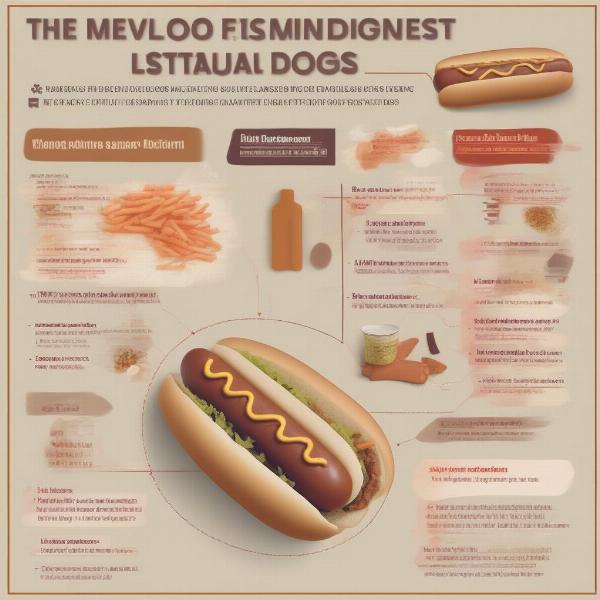The search term “hot dog cooker and bun warmer” raises an interesting point for dog owners. While we might enjoy a perfectly cooked hot dog, it’s essential to remember that processed meats like hot dogs aren’t ideal for our furry friends. This article will explore why hot dogs should be fed to dogs sparingly and discuss healthier alternatives to keep them happy and well-nourished.
Feeding our dogs can be a source of great joy. We love to see them enjoying their meals. However, it’s crucial to understand that what is tasty for us isn’t always beneficial for our canine companions. Hot dogs, while a popular human treat, are often loaded with sodium, preservatives, and other additives that can be detrimental to a dog’s health over time. Giving your dog a bite of your hot dog now and then likely won’t cause immediate harm, but making it a regular part of their diet is not recommended.
Why Aren’t Hot Dogs Ideal for Dogs?
The high sodium content in hot dogs is a primary concern. Excessive sodium can lead to dehydration, increased thirst, and potentially more serious issues like sodium ion poisoning. Furthermore, the preservatives and other additives used in processing hot dogs can contribute to digestive problems, allergies, and even long-term health risks.
 Hot Dog Ingredients
Hot Dog Ingredients
While a small bite of a hot dog occasionally isn’t likely to cause serious issues, regularly feeding them to your dog can contribute to obesity and related health complications. A balanced diet formulated for dogs is always the best approach to ensure they receive all the necessary nutrients for a healthy and happy life.
Healthy Alternatives to Hot Dogs for Your Dog
Fortunately, there are many healthier and equally enjoyable alternatives to offer your dog instead of hot dogs. These alternatives provide essential nutrients without the harmful additives.
Lean Protein Sources
Opt for lean protein sources like cooked chicken breast, turkey, or fish. These options are readily available, easy to prepare, and packed with essential amino acids for muscle development and overall health.
Fresh Fruits and Vegetables
Certain fruits and vegetables can also be a healthy and delicious addition to your dog’s diet. Carrots, blueberries, and apples (without the core and seeds) are excellent examples. These provide essential vitamins, minerals, and antioxidants. Always consult your veterinarian before introducing new fruits and vegetables to your dog’s diet to ensure they are safe and appropriate.
Dog-Specific Treats and Chews
A wide variety of commercially available dog treats and chews are formulated specifically for canine nutritional needs. Look for options that are low in sodium, free of artificial additives, and made with wholesome ingredients.
What to Do if Your Dog Eats Too Much Hot Dog
If your dog accidentally consumes a large amount of hot dog, monitor them closely for any signs of distress, such as vomiting, diarrhea, excessive thirst, or lethargy. If you observe any of these symptoms, contact your veterinarian immediately.
Conclusion
While the allure of sharing a hot dog with your furry friend is understandable, it’s important to prioritize their health and well-being by opting for healthier alternatives. By making informed choices about their diet, you can ensure your dog lives a long, happy, and healthy life. Remember, a balanced diet, regular exercise, and routine veterinary checkups are the keys to a thriving canine companion.
FAQs
- Can dogs eat hot dog buns? While plain white bread isn’t toxic, it offers little nutritional value and can contribute to weight gain. Avoid feeding your dog hot dog buns regularly.
- What are the signs of sodium poisoning in dogs? Signs include vomiting, diarrhea, tremors, seizures, and even coma. Seek immediate veterinary attention if you suspect sodium poisoning.
- Are there any types of hot dogs safe for dogs? Even low-sodium or “all-beef” hot dogs still contain additives that aren’t ideal for canine consumption. Stick to healthier alternatives.
- What should I feed my dog instead of hot dogs? Lean proteins, certain fruits and vegetables, and dog-specific treats are excellent alternatives.
- How can I make my dog’s food more appealing? Try adding a small amount of low-sodium chicken broth or mixing in a few pieces of cooked vegetables.
- What should I do if my dog steals a hot dog? Don’t panic. If it’s a small amount, they should be fine. Monitor them for any signs of distress and contact your vet if needed.
- Are there any human foods that are toxic to dogs? Yes, many foods are toxic to dogs, including chocolate, grapes, onions, and xylitol (an artificial sweetener).
ILM Dog is your trusted resource for expert advice on dog care and nutrition. We offer comprehensive information on dog breeds, health, training, nutrition, grooming, and much more. From puppy care to senior dog care, we provide practical tips and resources to help you navigate every stage of your dog’s life. For personalized advice on your dog’s dietary needs, contact our expert team at [email protected] or call us at +44 20-3965-8624. Visit ILM Dog for more information.